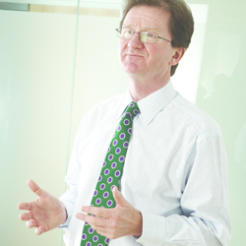The level of public trust that charities currently enjoy could be eroded if uncertainty over their definition grows, Charity Commission chief executive Sam Younger warned yesterday.
Younger was part of a panel of four sector experts invited to Charityworks’ ‘Future Charity?’ event last night to share their views on where the voluntary sector is headed.
“We could get to a point where charities are defined so widely that the name becomes meaningless,” Younger said. “It’s quite possible – undermining public trust and confidence because of that lack of definition.”
Younger earlier emphasised that the charity brand is powerful and enjoys “tremendous public confidence”.
He cited three reasons for this confidence: no private benefit; no political agenda, and focusing exclusively on beneficiaries.
But the Charity Commission CEO said that the picture is becoming more complex, and changes in the sector could cloud the meaning of ‘charity’ in the eyes of the public.
Younger cited factors such as more paid staff and administrative costs rising; the concept of paying trustees; new definitions like social enterprise emerging; and charities increasingly contracting with government, risking their perception as entirely apolitical.
He said: “The worry is that individuals will say, ‘Why should I give money to this organisation, or give up my time [to volunteer] for it? How is it any different to a profit-making private business?’”
Other speakers predict trends
The other speakers at last night’s event echoed Younger’s view that a clear definition of ‘charity’ is of paramount importance, as well as contributing their own individual insights about the voluntary sector’s present and future.
Jeremy Hughes, CEO of the Alzheimer’s Society, said that charities' income should not be coming so much from government contracts, and encouraged organisations to work better together.
Specifically, he said that charities should develop better systems for merging, and not do so “only out of necessity, to save one from dying”.
Laura Dosanjh, director of applied innovation at the Young Foundation, predicted trends for the sector’s next 20 years.
These included continued government cuts leading to more charities closing; more partnerships resulting in further blurring between social enterprise, businesses and charities; and more payment by results.
And finally, NCVO’s head of policy, research and foresight Karl Wilding expressed worry about how reliant the sector is on the support of a ‘civic core’ of middle-class people from the baby-boomer generation.
He speculated that the sector may have “blown its chance” of making the Big Society concept work by being too critical of it ("Nobody in government talks about it anymore").
And he predicted that over the next ten years public service delivery by the sector will only grow, but will be provided by a small handful of charities, all on payment-by-results contracts and funded by the social investment market.








